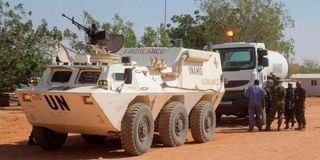Sudan to stand on its own feet as peacekeeping forces leave

The United Nations-African Union peacekeeping mission in Sudan’s Darfur region (Unamid) on February 15, 2021.
What you need to know:
- Deployed in 2007, Unamid was mandated to bring peace to the region.
- Conflict had broken out about four years earlier when local armed groups rose against the government of Omar al-Bashir, whom it accused of oppression.
- Bashir has since been ousted and is in jail for corruption.
Sudan on Wednesday started testing its ability to provide security and other services to regions initially engulfed in war, after African Union and United Nations peacekeeping forces officially left the country.
Wednesday, June 30, was the last day for the AU-UN Hybrid Operation in Darfur (Unamid) to complete the phase-out under UN Security Council Resolution 2559 (2020), which terminated the mandate of the mission in January.
Deployed in 2007, Unamid was mandated to bring peace to a region where conflict had broken out about four years earlier when local armed groups rose against the government of Omar al-Bashir, whom it accused of oppression.
Bashir has since been ousted and is in jail for corruption, but the conflict in Darfur is said to have left 300,000 dead and another three million displaced, according to UN estimates.
Unamid’s departure means Khartoum, which has worked to reconcile with various armed groups, will now be in charge of overall security for the country, for the first time in 15 years.
Babacar Cisse, the UN assistant secretary-general in charge of UNAMID, will now oversee the phase-out period. That will include finalising staff departures, repatriating assets, transferring team sites to local authorities and working with the government on related issues.
Unamid, in its term, had seen over 100,000 military and police peacekeepers deployed to Darfur. Its highest contingent was 23,000 troops in 2011 but by the time the mandate ended, it had just about 7,000 forces and civilian personnel, most of whom have returned to their countries.
Unamid said it had handed over 14 team sites to the government, which has committed to using them for civilian purposes and in line with the framework agreement signed on March 4 this year.
These facilities will be used for healthcare, education and other social services, including vocational training and community centres as identified by members of local communities, officials said.
While the responsibility for ensuring the safety and protection of sites rests with the central government, the Darfur state government remains responsible for ensuring that the facilities are used as intended.
The government of Sudan has established a Joint Task Force and State Delivery Committees as key interlocutors for Unamid during the phase-out, which officials say will not involve the military aspect.
Instead, officials will consider the specific needs of each community and provide services such as water and sanitation trucks, water treatment equipment, generators and vehicles, which Unamid had been providing.
Unamid had provided Darfuri communities with 193 vehicles, including 27 water and sanitation trucks and 196 generators, and donated its clinic in Zalingei and medical facilities in Nyala and Kabkabiya for use by local communities.
“Good coordination and cooperation with the government of Sudan has been crucial in meeting the tight timetable and criteria set by the Security Council for the phase-out period,” Cisse told reporters in Khartoum on Wednesday.
“Likewise, it will be important for the government to ensure the protection of the logistics base and the repatriation of the remaining staff to facilitate a smooth liquidation phase.”
There were challenges, including looting by communities, as well as the general geographical locale of Sudan’s war-scarred Darfur, which largely has no paved roads or other facilities. Cisse admitted there had been a misunderstanding with locals at some point as the forces prepared to depart. Some, he said, demanded all the assets be handed to local communities.
As one of the largest peacekeeping operations in the history of the UN, UNAMID has provided a security environment in Darfur for more than a decade. The departure now leaves the duty of protecting civilians in the hands of the Transitional Government of Sudan, now under Prime Minister Abdalla Hamdok.
Cisse argued the mission will leave the country better prepared and that it had conducted some programmes such as resettling displaced civilians and economic support, as well as women’s empowerment including addressing sexual and gender-based violence.
From Thursday, Unamid now enters the ‘liquidation phase’, which will mostly focus on transferring the remaining property the mission owned to either Sudan or other places deemed useful.
A policing unit made up of 363 staff will remain behind to protect UN personnel, facilities and assets in the El Fasher Logistics Base, where the mission was based.
In turn, the joint Sudanese forces will continue to deploy outside the base under the command of the government of Sudan, in close coordination with the UNAMID elimination team, Cisse explained.
These forces will have a joint responsibility to secure the perimeter of the base, provide safety and security for UN personnel, and ensure that incoming convoys of contingent-owned assets and equipment can arrive without incident.





